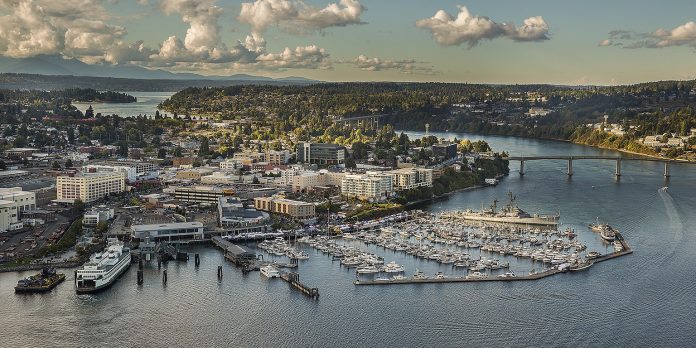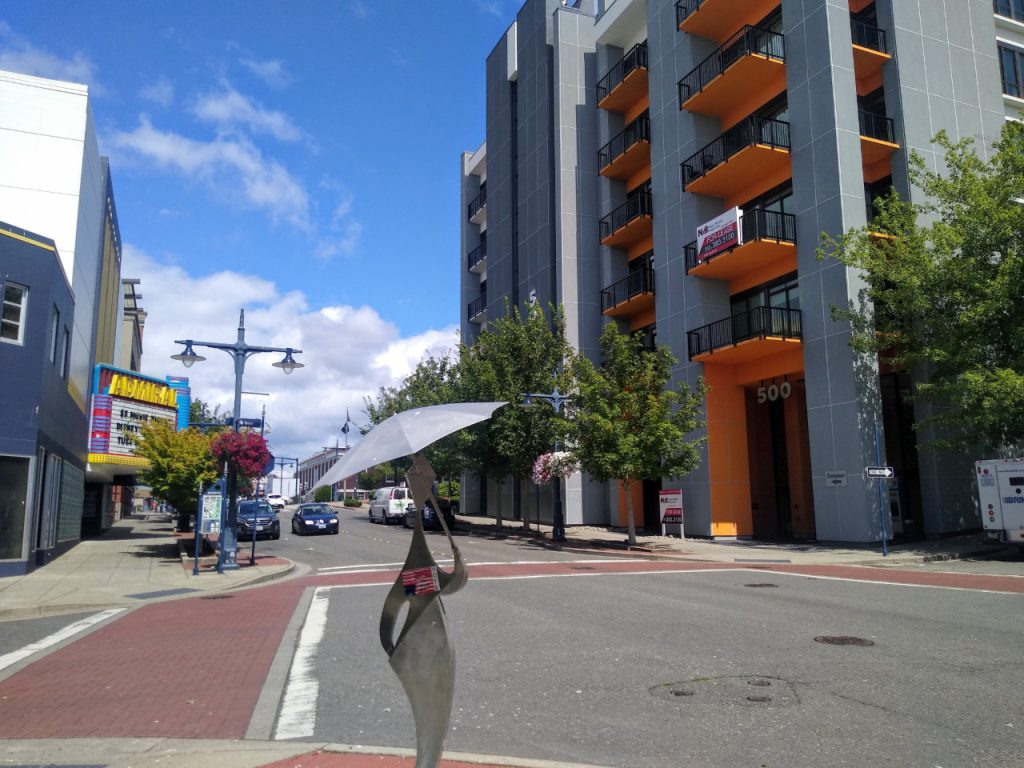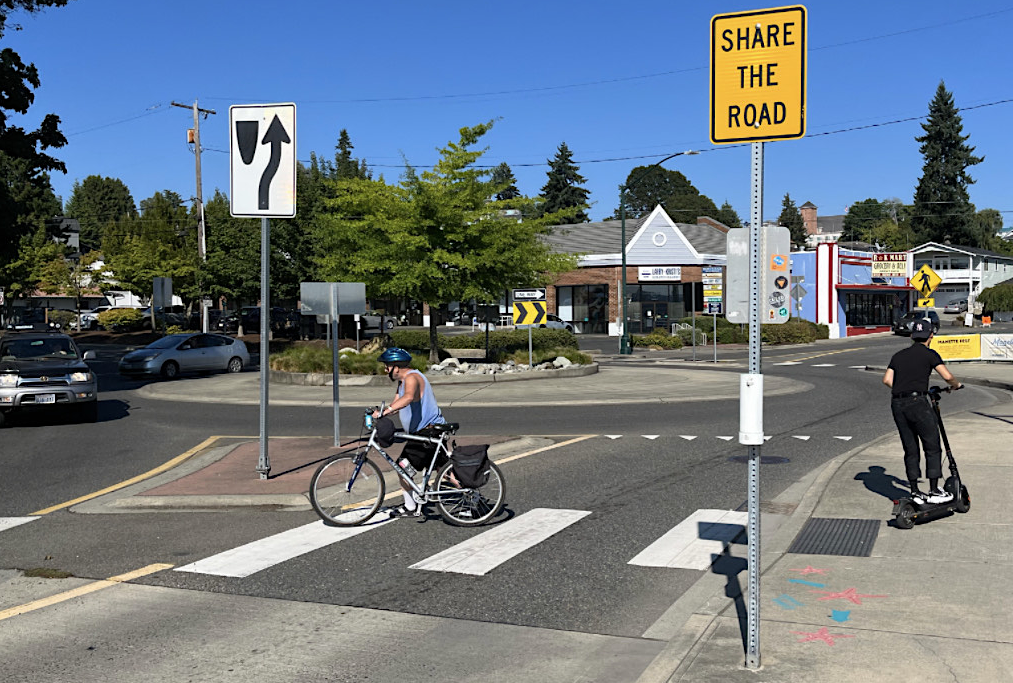
By a 6-1 vote Wednesday night, the Bremerton City Council voted to join Spokane, Port Townsend, and Bellingham in fully repealing parking mandates on new development. The move, recommended unanimously by the city’s planning commission, is intended to reduce housing costs, encourage additional density, and prioritize additional modes of travel including walking, biking, and transit. Framed as “market-based parking,” builders in Bremerton will be able to tailor their off-street parking needs based on anticipated demand rather than arbitrary ratio laid out in the city’s land use code.
Bremerton’s newly adopted Comprehensive Plan, approved on the same night, anticipates significant housing growth in a city that’s currently home to just over 45,000 people. The plan primes Downtown Bremerton for a building boom, raising height limits to 80 feet and removing all density limits for new development. Additional planned density is focused in commercial centers around the city and along a planned bus rapid transit line that is envisioned in Kitsap Transit’s long-range plan.
With parking mandates dropped, builders in Bremerton have the option to choose additional homes over parking, particularly in areas close to transit. Structured parking in new apartment buildings can cost builders up to $60,000 per stall, according to the Sightline Institute, a cost that is passed onto the renters who live in those buildings.
Parking mandates also put a damper on the opening of new businesses, requiring business owners to add parking to existing environments when wanting to change a use. This dynamic contributed to the hollowing out of historic main street business districts in favor of sprawled-out strip malls.

“This does not ban parking. It doesn’t prohibit parking. It doesn’t remove any existing parking, and we have a lot of surface lots across the city already. What it does do is enable extra housing. It enables businesses,” said Councilmember Jeff Coughlin, challenging incumbent Mayor Greg Wheeler to lead the city in this fall’s election, on Wednesday night. “We have the parking, and we have the ability to manage it. We just have to be smart about it. But when it comes to tackling these longstanding Bremerton problems that have not gotten better, this is a concrete step we can take. I’m happy to be bold. We need to take the lead. We need to do something big. This is something big.”
With a council that is highly focused on improving safety for people walking and biking, Bremerton’s leaders framed the change as pushing the city toward a place where depending on a single-occupancy vehicle to get around is less necessary.
“In theory, we’re supposed to be growing a city, and every city I’ve lived in, from New Orleans to New York City and Boston, I never owned a car. I walked everywhere or took a bus, or if was a little bit farther, got a cab,” Councilmember Jane Rebelowski said, noting that there’s a positive feedback loop between housing density and transit improvements. “So hopefully by [passing] this — and we get more tight development in areas — Kitsap Transit will get better.”

“Parking is absolutely a hindrance to home construction. Without a doubt, this is a huge opportunity for the City of Bremerton to be the leader in the county and in western Washington,” Jake Carter, the director of construction for Habitat for Humanity of Kitsap County, told the council. “It’s a chicken and an egg. We can’t have housing. We can’t have transit. You look at transit models, they’re based on housing density. […] Parking inhibits housing, period.”
Bremerton is on the leading edge of a wave of parking reform that is set to overtake Washington State thanks to recent moves by the legislature. With the passage of Senate Bill 5184 earlier this year, all cities with more than 30,000 people will be forced to curb the mandates in their land use codes within three years. The newly enacted law includes a new ceiling of one stall for every two units in an apartment building, with additional exemptions for affordable housing, senior housing, and smaller housing units — everything under 1,200 square feet.
While some cities, like Lynnwood, are already taking steps to adopt the framework of these new requirements as written, others are following Bremerton’s lead and exploring dropping mandates entirely, a move that is much simpler and includes less potential for unintended incentives. For example, if cities want to encourage more two and three-bedroom units, an exemption for smaller units might actually work against that.
Shoreline, which committed to unraveling parking from its land use code late last year, is still heading toward that goal, and earlier this year a majority of the Bothell City Council signed onto the idea as well. But it remains notable that cities outside of King County, which is home to the most frequent transit service in the state, moved forward first, debunking the idea that abolishing parking mandates is only possible in areas of the state with incredibly high levels of transit service.
The impacts of mandating copious parking are far-reaching, driving up air pollution that worsens human health and generating runoff contaminated with toxic tire chemicals (i.e., 6PPDQ) that has been tied to declining salmon runs. Bothell Mayor Mason Thompson drew just this connection.
“Parking is a government-mandated tax on new housing and small businesses that we want, and the result that we get from it is more pavement, more air pollution, more tire dust, 6PPDQ pollution, and we know that it drives more traffic,” Bothell Mayor Mason Thompson said in April.
With more and more cities realizing the detrimental impacts that parking mandates have on their built environment and their goals around improving transit and mobility, Bremerton is part of an early group of trend-setting cities, but there almost certainly will be more to come.
Ryan Packer has been writing for The Urbanist since 2015, and currently reports full-time as Contributing Editor. Their beats are transportation, land use, public space, traffic safety, and obscure community meetings. Packer has also reported for other regional outlets including BikePortland, Seattle Met, and PubliCola. They live in the Capitol Hill neighborhood of Seattle.




